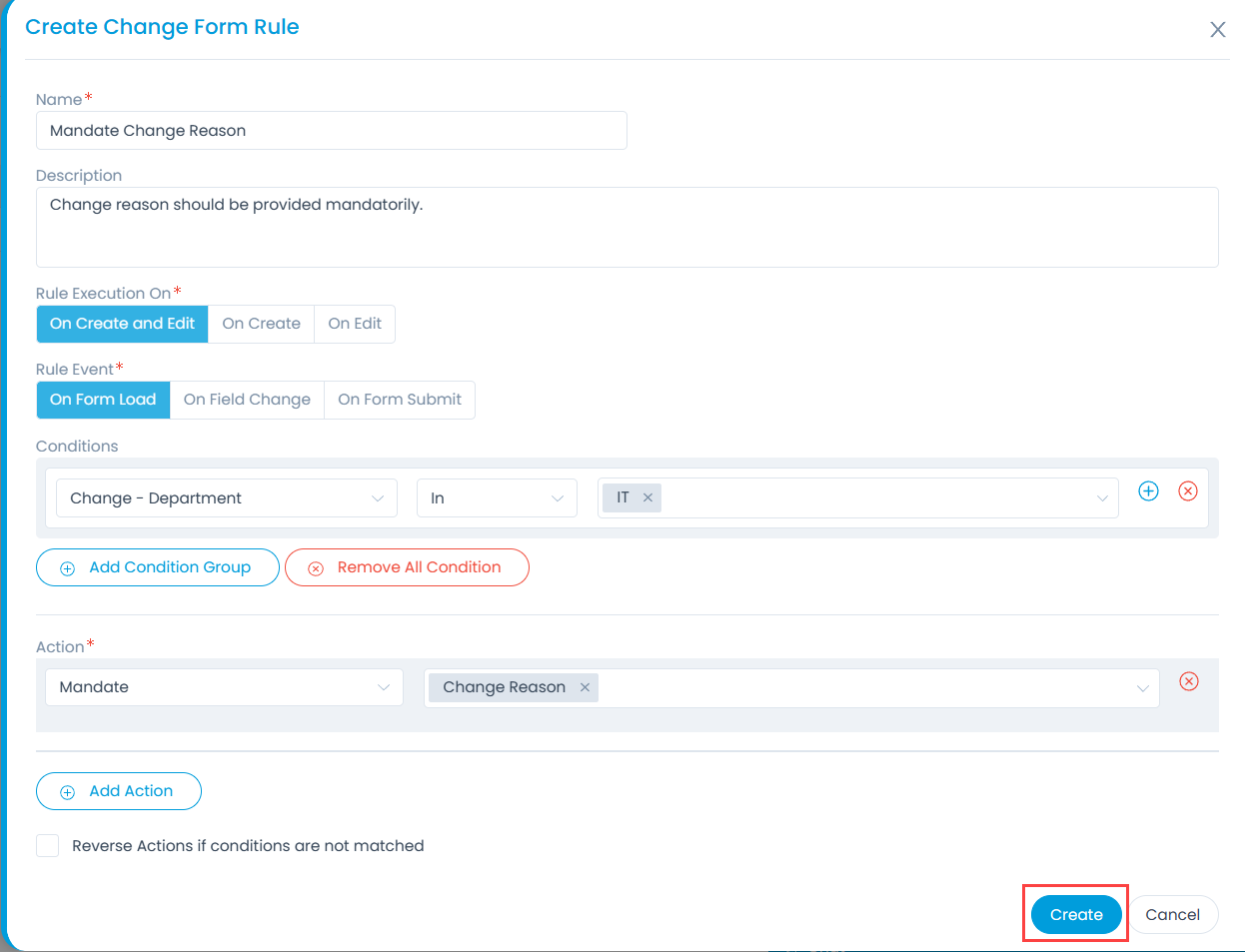Change Form Rules
The change form rules enable you to make fields (system and custom) mandatory/non-mandatory, show/hide, enable/disable, set/clear value, or show/hide options based on the certain conditions in the change form. These rules are applicable at the time of change creation, edit, or both. This helps you to fetch the required details from the user.
To view the Change Form Rules, navigate to Admin > Change Management > Change Form Rules.

The page displays a list of already created rules along with the below options:
- Search: You can search for the required rule using keywords.
- Create Change Form Rule: You can create a change form rule.
- Enabled: You can enable or disable a change form rule. By default it is enabled. If disabled the rule will not be applied to the Change Form.
- Re-order: You can re-order the rule using drag and drop.
- Duplicate: You can create a duplicate rule based on the existing one.
- Edit: You can edit the rule to make some changes in it.
- Delete: You can delete the unwanted rules. A confirmation message appears. Click Yes to continue or Cancel to stop the process.
Create a Change Form Rule
To create a form rule, follow the below steps:
- Click the Create Change Form Rule button on the top-right corner of the page. A popup appears.
The Change Form Rule actions like hide, non-mandate, disable, and clear value may not work for System Fields like Subject, Requester, Status, etc. as their default property has higher priority.

- Enter the following details:
- Name: Enter the name of the Change Form Rule.
- Description: Enter a short description about the Change Form Rule.
- Rule Execution On: Select when you want to execute the rule. The options are:
- On Create and Edit: Select if you want the form rule to execute at the time of creating or editing a change.
- On Create: Select if you want the form rule to execute at the time of change creation only.
- On Edit: Select if you want the form rule to execute at the time of editing the change.
- Rule Event: Select on which event the rule should get executed. The options are:
- On Form Load: Select to apply the rule when the form loads.
- On Field Change: Select to apply the rule when the value of a field changes.
- On Form Submit: Select to apply the rule when the form is submitted.
- Conditions: Define the conditions here that will be evaluated in the change form to apply the rule. The conditions are grouped into Request Fields, Change Fields, Logged-in Users Fields, and Requester Fields. You can define multiple conditions here. All the conditions work in AND form. It means the rule is applicable only when all the conditions are true.

- Condition Parameter: Select a condition parameter from the dropdown list.
- Operator: Select the operator: In/Not In from the dropdown list.
- Value: Select the value for condition. You can select multiple values of which the first value will be displayed in full, followed by the count of all additional values selected.
You can also click the Add Condition Group button to add more conditions in the Change Form Rule. Click on Remove All Condition to remove all the conditions of the Change Form Rule.
Action: Select the action and its value(s) for the selected conditions from the given list. In the below figure, the Change Reason field will become mandatory if the IT Department is selected in the change form. You can add more actions using the Add Action button.
Show: To make the required field visible on the Change Form when the conditions of the form rule match.
Hide: To hide the required field on the Change Form when the conditions of the form rule match. Once a field is hidden, you can also apply the clear value and set value actions on it.
Mandate: To make the required field mandatory on the Change Form when the conditions of the form rule match.
Non-Mandate: To make the required field optional on the Change Form when the conditions of the form rule match.
Enable: To enable the required field on the Change Form when the conditions of the form rule match.
Disable: To disable the required field on the Change Form when the conditions of the form rule match.
Set Value: To set the value of the required field on the Change Form when the conditions of the form rule match.
Clear Value: To clear the value of the required field on the Change Form when the conditions of the form rule match.
Show Options: To view the options of the required dropdown field on the Change Form when the conditions of the form rule match.
Hide Options: To hide the options of the required dropdown field on the Change Form when the conditions of the form rule match. The fields whose options can be hidden are Technician Group, Schedule End Date, Vendor, Assignee, Target Environment, Department, Requester, Status, Priority, Change Reason, Change Type, Category, Urgency, Location, Change Risk, Schedule Start Date, and Impact.
Run Custom Script: To run the custom script and get the data accordingly in the required field.
Filter Date: To filter the user details based on the selected user's and requester's field respectively.
For example, On Create Change page, if you want to filter the list of Assignee based on the User's and Requester's location, in the Form Rule, set the Action as Filter Data, Assignee, User's field - Location, and Requester's field - Location. Now, while creating/editing the Change Request, the list of Assignee will appear based on the Location field.

- Reverse Actions if conditions are not matched: Enable if you want to reverse the actions when the conditions do not match in the change form. This is available only if Conditions are added.
- Once done, click Create.